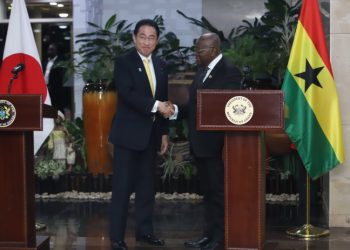In light of several systemic challenges affecting Ghana’s loans and debt management, the Economic Governance Platform (EGP), with support from Open Society Africa, has commissioned a comprehensive research initiative to diagnose the root causes of the country’s debt distress.
The initiative involved three focused studies aimed at evaluating the institutional, legal, and policy dimensions of the country’s debt governance.
The first study examined Ghana’s debt management frameworks and the institutional capacities responsible for debt accumulation and repayment.
The second focused on transparency and accountability, assessing the robustness of public debt reporting, the effectiveness of parliamentary engagement, and the extent of citizen involvement in debt-related decision-making processes.
The third study centred on debt accumulation patterns, mitigation strategies, and prospects for long-term fiscal sustainability. It explored the structural drivers of borrowing, the design and implementation of debt servicing mechanisms, and policy alternatives for achieving macroeconomic stability.
The findings from these studies provide a holistic picture of the country’s debt vulnerabilities and offer strategic recommendations for reform.
Through this evidence-based approach, the EGP aims to stimulate national dialogue, strengthen institutional accountability, and support the development of a more sustainable and transparent debt management regime for Ghana with some 14 measures.
1. Strengthen domestic revenue mobilization
Ghana must broaden its tax base and enhance compliance through digitalisation and
targeted tax education. Closing loopholes in trade misinvoicing, property taxation,
exemptions, transfer pricing, and illicit financial flows, especially in the extractives sector,
can significantly increase revenue. Current tax exemptions on VAT, income tax, and
import duties result in a revenue loss of nearly 4% of GDP. Reversing this trend is critical
for sustainable financing.
2. Reinforce Anti-Corruption and financial oversight
To tackle illicit financial flows and reduce leakages, anti-corruption agencies like the
The Office of the Special Prosecutor (OSP) and EOCO must be empowered and resourced.
The adoption of modern technologies, such as Blockchain, can improve traceability,
reduce fraud, and increase public trust. Regular audits and enforcement of anti-money laundering measures should be standard practice.
3. Control public spending and boost efficiency
Ghana must reduce wasteful and rigid public spending, particularly on wages,
subsidies, and non-priority programs. A streamlined payroll, better procurement
governance, and the proposed establishment of a Department of Government
Efficiency—or a fully independent and well-resourced Fiscal Council—could help
enforce fiscal discipline. Parliament must also be empowered to scrutinize fiscal policies
and borrowing decisions more effectively.
4. Reform the legal framework for fiscal responsibility
Amendments to the Fiscal Responsibility Act and Public Financial Management Act are
essential to introduce clearer rules, including debt and deficit limits, and to enforce
penalties for non-compliance. The escape clause must include a strict timeline for
returning to fiscal rules after emergencies. Parliamentary oversight over deviations
should be mandatory.
5. Improve budget execution and expenditure tracking
Full integration of MDAs and MMDAs into the Ghana Integrated Financial Management
Information System (GIFMIS), alongside the Ghana Electronic Procurement System
(GHANEPS), will enhance spending oversight and ensure that only projects with
approved budgets proceed to implementation. This reform, already part of Ghana’s IMF
program is crucial for transparency and accountability.
6. Institutionalise a credible debt sustainability framework
Ghana should fully adopt and implement a forward-looking Debt Sustainability
Framework (DSF) aligned with international standards. This includes routine reviews of
debt dynamics, stress testing against shocks (like commodity price fluctuations or
recessions), and applying risk mitigation measures. All public investments must undergo
a rigorous Public Investment Management (PIM) appraisal process, with only vetted
projects receiving financing, particularly those exceeding US$1 million.
7. Re-establish and protect the sinking fund
Reviving the Sinking Fund with regular contributions will help manage debt repayments
and reduce rollover risks. Parliamentary oversight of the Fund is essential to ensure its
proper use and sustainability.
8. Curb inflationary financing and strengthen central bank oversight
The Bank of Ghana’s lending to government, capped at 5% of the previous year’s
revenue, should be strictly enforced, and any exception jointly approved by Parliament,
the Governor, and the Finance Minister. Additionally, the Bank’s debt management
operations must be clearly separated from its monetary policy functions to maintain
credibility and avoid conflicts of interest. All significant foreign borrowing or guarantees
must receive parliamentary approval.
9. Institutionalise an independent fiscal council
Establishing a politically independent Fiscal Council is central to strengthening fiscal
accountability. The Council should have a legal mandate, clear powers, and operational
independence to evaluate fiscal risks, assess policy credibility, monitor debt targets, and
track compliance with fiscal rules. It should also support Parliament with independent
analysis.
10. Promote transparency in debt reporting and classification
All public debt, whether central government, contingent liabilities, or off-balance-sheet
arrangements such as ESLA and DAAKYE must be fully disclosed. Underreporting
debt distorts Ghana’s fiscal outlook and undermines investor confidence. The Public
Debt Management Office (PDMO) should regularly publish accurate and comprehensive
debt data.
11. Enhance post-loan monitoring and evaluation
A strong post-loan monitoring system must be developed under the Fiscal Council to
ensure that borrowed funds are used effectively and deliver value for money. All major
loan agreements must include a business case, a logical framework, and monitoring and
evaluation plan.
12. Strengthen procurement governance and PFM reform integration
The dominance of sole-sourcing and restricted tendering, especially in high-value
contracts have reduced competition and inflated public costs. Reforms must prioritize
competitive tendering and be integrated with broader Public Financial Management
(PFM) reforms, such as project appraisal and transparent reporting.
13. Shift focus from Debt-to-GDP to broader sustainability indicators
Reliance on headline debt-to-GDP ratios alone can mask risks. Ghana must embrace
forward-looking indicators from the IMF/IDA Debt Sustainability Framework to better
assess debt risks and ensure more responsible borrowing decisions.
14. Promote stakeholder engagement and fiscal strategy transparency
The development and implementation of Ghana’s Fiscal Strategy must be inclusive and
transparent. Civil society, Parliament, and the public must be engaged in shaping and
monitoring the country’s path to debt sustainability.
DISCLAIMER: The Views, Comments, Opinions, Contributions and Statements made by Readers and Contributors on this platform do not necessarily represent the views or policy of Multimedia Group Limited.
DISCLAIMER: The Views, Comments, Opinions, Contributions and Statements made by Readers and Contributors on this platform do not necessarily represent the views or policy of Multimedia Group Limited.
- President Commissions 36.5 Million Dollars Hospital In The Tain District
- You Will Not Go Free For Killing An Hard Working MP – Akufo-Addo To MP’s Killer
- I Will Lead You To Victory – Ato Forson Assures NDC Supporters
Visit Our Social Media for More




